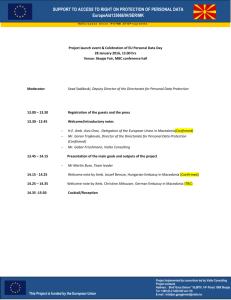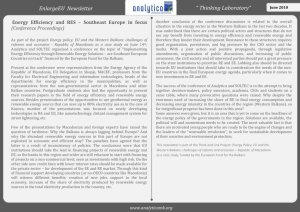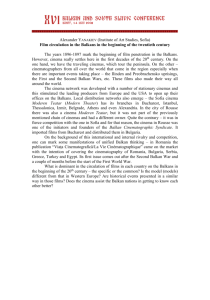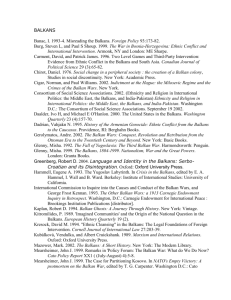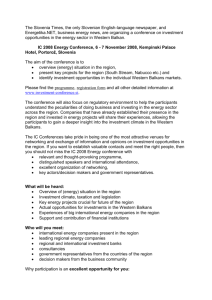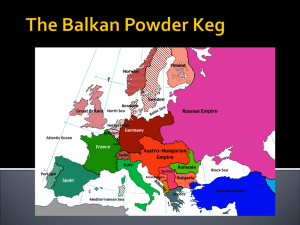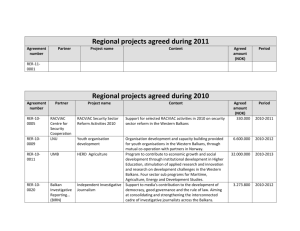AGENDA-Balkan-Benelux - Institute for Political and
advertisement
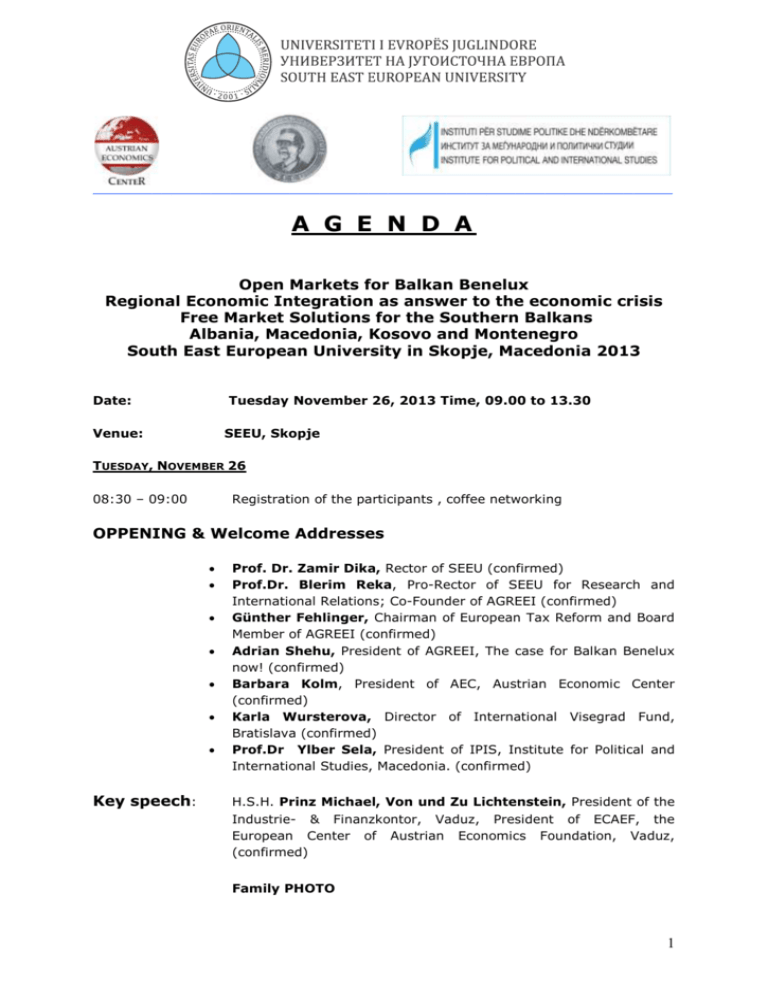
___________________________________________________________ A G E N D A Open Markets for Balkan Benelux Regional Economic Integration as answer to the economic crisis Free Market Solutions for the Southern Balkans Albania, Macedonia, Kosovo and Montenegro South East European University in Skopje, Macedonia 2013 Date: Tuesday November 26, 2013 Time, 09.00 to 13.30 Venue: SEEU, Skopje TUESDAY, NOVEMBER 26 08:30 – 09:00 Registration of the participants , coffee networking OPPENING & Welcome Addresses Key speech: Prof. Dr. Zamir Dika, Rector of SEEU (confirmed) Prof.Dr. Blerim Reka, Pro-Rector of SEEU for Research and International Relations; Co-Founder of AGREEI (confirmed) Günther Fehlinger, Chairman of European Tax Reform and Board Member of AGREEI (confirmed) Adrian Shehu, President of AGREEI, The case for Balkan Benelux now! (confirmed) Barbara Kolm, President of AEC, Austrian Economic Center (confirmed) Karla Wursterova, Director of International Visegrad Fund, Bratislava (confirmed) Prof.Dr Ylber Sela, President of IPIS, Institute for Political and International Studies, Macedonia. (confirmed) H.S.H. Prinz Michael, Von und Zu Lichtenstein, President of the Industrie- & Finanzkontor, Vaduz, President of ECAEF, the European Center of Austrian Economics Foundation, Vaduz, (confirmed) Family PHOTO 1 First Session 09:45 – 11:00 “Political-strategic dimension of economic and political integration of the Southern Balkans” Key Note Speaker HE Valon Saraçini, Minister for Economy and Trade Macedonia, METE, The regional trade policy of the government of Macedonia (confirmed) HE Arben Ahmetaj, Minister for Economy and Trade Albania, METE, The regional trade policy of the new government of Albania, tbc HE Besim Beqaj, Minister of Finance Kosovo, The regional trade policy of the new government of Kosovo, (confirmed) HE Bojana Boskovic, Deputy Minister of Finance, Montenegro, Economic Reform in Montenegro, The Montenegro role model for the region, tbc Barbara Kolm, President of AEC, Austrian Economic Center, (confirmed) Prof. Dr. Miroljub Sukarov, Prorector for Budget SEEU, (confirmed) Shqipe Patina, Civil Society Activist Kosovo, The Kosovo civil society perspective, Board Member of AGREEI, (confirmed) 11:00-11:15 Coffee break 11:15-12:45 Second Session: “Economic-strategic dimension of Regional Economic Integration - what are the essential Reform Pillars for the success of the southern Balkans in the coming years” 12:45-13:15 13:15-13:30 13:30 HE Fatmir Besimi, Deputy Prime Minister of Macedonia, tbc HE Izet Mexhiti, Mayor of Chair Municipality – Skopje, Macedonia (confirmed) HE Menderes Kuci, President of the Economic Chamber of Northwest Macedonia, (confirmed) Victor Tirfunovski, Libertarian Club of Macedonia, leading free market reformer of Macedonia (confirmed) Günther Fehlinger, Board Member of AGREEI, Prosperity in possible, A possible Pearl River Delta scenario for the southern Balkans based on Balkan Benelux Round table of participants: Assessing the state of economic liberty in Albania, Kosovo, Macedonia and Montenegro, the road ahead for a more Open Southern Balkans based on and Free Market solutions Concluding remarks Barbara Kolm, President of AEC, How Austrian Economics can transform poor countries towards development. The case for free trade Günther Fehlinger, Chairman of European Tax Reform and Board Member of AGREEI Business, lunch, Hotel 2 Focus Regional economic integration Albania, Kosovo, Macedonia and Montenegro based on the Benelux model The current global crisis has reached the southern Balkans at a very unfortunate moment just at the end of the first decade of reconstruction and statehood. Now in the 6ht year of the crisis public, companies and family reserves are reaching a new low. The modest achievements in savings and wealth accumulated in the reconstruction decade are reaching their limit. Many built in buffers in countries, companies and families used to hard time and deep crisis being a reality for the last decades reach their end. Greece and Italia as main partners continue to be far from their past strength and motor of development of the region. One of the remedies for the southern Balkans is stronger regional economic integration and new export markets within the region. This is true for all 4 countries of the Southern Balkans. Albania, Macedonia, Kosovo and Montenegro will benefit from closer cooperation and the international community should actively encourage and support such integration efforts. The main strategic objective of the Balkan Benelux project is to create a market of 8 ME with free movement of goods, services, capital and people. Much faster than an eventual EU Membership, obviously the ultimate goal of all southern Balkans countries, such a new partnership will bring these countries together and so allow them to create a joint economic dynamic and a growth agenda missing up to now. The countries need economic growth now and have no time too loose. Growth is necessary to create jobs, prosperity and living conditions to keep the people here in the region by creating the conditions for sustainable economic growth and ensuring the ambitious EU Integration agenda can be realized. All 4 countries will only be member of the EU in foreseeable future if they are seen as a success story in Brussels and the EU member states capitals. Successfully cooperating within the region will lead first to better economic conditions and will as well be a contribution to convince the EU that the region is mature and ready for the EU. Possible role models for such cooperation might be the Benelux, Visegrad and Northern Council cooperation in other parts of the EU. Create Balkan Benelux – a region focused on growth At this event we want to discuss the fundamental reasons and key factors for determining future growth of the southern Balkans. Do we have the stay the poorest region of Europe and live mainly of labor export and remittances of the diaspora and foreign aid and international transfers and from mineral, petrol and scrap export? Is this a economic reality for the next decades or can the southern Balkans learn from the success models of the Baltics, central Europe, the Caucasus or some parts of Asia and the Middle East and kick start growth and attract much larger levels of investment, create jobs for the younger generation and ultimately as well attract the diaspora to come back to what is one of the lowest populated region in Europe. Our approach to turning the Southern Balkans countries into a successful Balkan Benelux region are clear free market solutions based on Austrian Economics as outlined in this conference. Turning the poorest region of Europe into the most competitive, open, and growing region of Europe as a model for Greece, the Balkans and all of Europe might be a far call but we are convinced it can be achieved. Western and Southern Europe are still slow to reform towards more open and free markets and lower and best flat taxes which would liberate the creative and productive energy of the Europeans. Some countries even go to the opposite extreme and do about everything wrong in terms of taxation, growth and economic freedom and try to impose their economic vision and rigidities via Brussels towards all of Europe including the more successful and dynamic growing part of Europe in the center and east of Europe. These dramatic developments must be addressed and all supporters of reform should work closely together to ensure progress on the freedom agenda in Western Europe. Given the vested interest and lack of strong free market 3 focused leadership this might be a long and difficult struggle and this is the reason for the proposal to develop a special focus on the southern Balkans countries Montenegro, Kosovo, Macedonia and Albania. Here the freedom agenda is attractive and leaders some by conviction, some often simple by the lack of public finances to copy western European welfare systems are ready to listen and implement and agenda based on freedom and growth. To realize this vision the AGREEI, the Action Group for Economic and European Integration is proposing to develop Balkan Benelux, a common market of 8 Million people based on the Benelux and Visegrad models in Western and Central Europe. Creating such a common market now and not once all countries have joined the EU eventually will increase volume, overcome borders and attract more investors and the region with its flat tax system of 10% and its great harbors of Bar, Durres and Vlora can will serve as a excellent new European hub and cheap manufacturing and logistic hubs bases for trade with China, India and the rest of the world with easy access to the Italian, German and Eastern European markets. Towards a common market of the southern Balkans open to the world It is proposed to achieve this by constant promotion of cooperation and competition between these highly competitive countries and promote best practices of the free market portfolio like the Georgian model of anti-corruption, immigration reform and public administration reform and LEAP model to create special development zone based on clean administration and judicial outsourcing. The region has achieved already and is ready to work with free market solutions and has successful private universities and hospitals, all have the flat tax of maximum 10%, Kosovo has a funded individual retirement systems, Macedonia is ranked in excellence its reforms in facilitating business and Montenegro has one of the most transparent Kataster systems backbone of its property boom during the last decade. But the crisis exposes the defunct relicts of Yugoslavian socialism and Enver Hoxha most tragic and most brutal dictatorship and his legacy in economic thinking and administration and so there is a wide area in which reforms are necessary including more political openness, reduction of corruption and reform of the labor market and more openness towards foreign labor and immigration. Europe has overcome borders in the last 20 years and here in the southern Balkans there was just developed and these borders are now major obstacles for trade and free movement. To quote Roland Reagan in Berlin at his famous speech in 1985 it is now time to tear down these borders and open this new countries to intra and extra regional trade and to the world and maybe as Mark Klugmann has formulated this region of the Balkan Benelux can contribute to the success of Europe in a significant manner if it can develop into the Pearl River Delta of Europe and attract investment, labor, capital and innovation in a similar model like the same size region around Hong Kong. Protect us from Protectionism The recent trade wars and embargos and boycotts focused on cement, potatoes, honey and possible leading to an escalating trade conflict as currently possible between Kosovo and Macedonia show that old solutions focused on protectionism and government scarifying public interest for vested industry clients both local and international are still the rule in the southern Balkans. Economic populism is celebrating now heights, as simplistic solutions are easier to sell to an electorate facing 50% unemployment and still trapped in a collective trauma of war and ethnic antagonism. This is wrong and it is always the consumer meaning the middle class family paying the price for protectionism and in medium term all sides are worse off. The international community should sit and watch an escalating trade conflict to happen in the southern Balkans and Balkan Benelux is very much the answer to these negative trends in the region. Yes we understand the trend goes towards protectionism but this is very much the reason we want to show the world and the public that this is the wrong way and regional economic integration is the right way and it can be done now and it is time for Balkan Benelux. Now! 4
